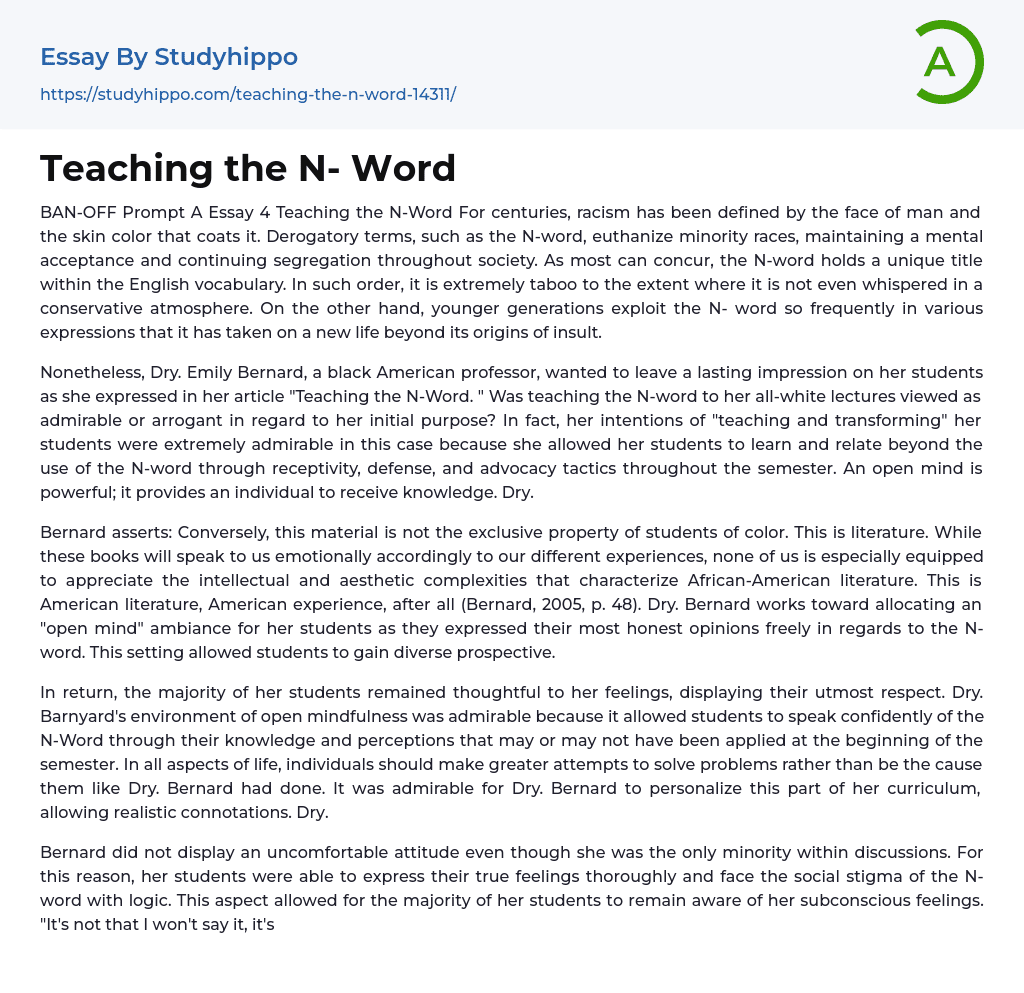Teaching the N-word has generated extensive debate due to its derogatory nature and role in perpetuating racism and segregation. While some conservative environments deem it taboo, younger generations have embraced it with a redefined meaning. Dr. Emily Bernard, an African American professor, sought to educate her all-white students about the N-word to broaden their understanding. Despite facing inquiries about her intentions, she admirably aimed to transform and enlighten her students by approaching the topic with an open mind. Bernard emphasized that this material should not be exclusive to students of color; instead, it is literature from which everyone can learn. Grasping the intellectual and aesthetic complexities inherent in African-American literature necessitates more than individual experiences alone—it reflects the broader American experience (Bernard, 2005, p.48). In her classroom, Bernard cultivates an environment of open-mindedness where stud
...ents are encouraged to freely express their opinions on the N-word—a setting that allows for diverse perspectives and promotes mutual respect for each other's emotions. Bernard's dedication to fostering such a receptive atmosphere is commendable as it enables students to confidently discuss the N-word based on their own knowledge and perceptions throughout the semester. Dry.Bernard has demonstrated how important it is for individuals in all aspects of life to strive towards problem-solving rather than causing them.
Bernard's incorporation of personalization into her curriculum, allowing for authentic connections, is admirable. Despite being the only minority in the discussions, she remains comfortable and unfazed. Her approach enables her students to fully express their feelings and confront the social stigma surrounding the N-word with logical reasoning. This aspect also makes her students aware of her underlying emotions. Sarah, one of Bernard's students, confessed, "It's
not that I won't say it, it's not that I don't want to say it, I will not say it" (Bernard, 2005, p.50). It is crucial for individuals to grow and learn from acquired knowledge throughout their lives. As the saying goes, "if we do not stand for something, we will fall for anything." Dry.Bernard exemplifies standing up for a purpose regardless of cultural background by personally practicing this principle and empowering her students to do so as well. Rather than imposing her viewpoint on the N-word onto them forcefully, she allows them to naturally comprehend its significance and form their own conclusions about it. Throughout the semester under Dry.Bernard's guidance, her students develop a deeper understanding of race relations, divergence,and language in general.As an African American woman like Dry.Bernard,I commend her effective education efforts.I personally admire Dry.Bernard for pushing beyond her comfort zone to address such a controversial concept.By the end of the article, Dr. Bernard had welcomed her students into her home and heart like family. It is commendable that she undertook such actions because it is crucial to educate others on controversial aspects of life while being confident in doing so. At times, those who are knowledgeable become educators for those who lack knowledge, allowing a continual dissemination of knowledge. The N-word has been examined from various perspectives and will continue to be a symbol of diversity in the past and present, influencing our future choices.
Permitting the discussion of the N-word was an extraordinary example of empowerment.Was it due to it being confronted by a black woman? Or perhaps because she was one of the few colored individuals at Universityof Vermont as
an African American Literature professor? One thing is certain: Dr.Bernard was able to step outside her comfort zone to enlighten her students about the history of the N-word throughout the years.If nothing else is definite, it is undeniable that Dr.In his article "Teaching the N-Word," Bernard (2005) portrays Bernard as a leader who exhibits impressive admiration and bravery, deserving utmost respect.
- Unconscious Mind essays
- Age Of Enlightenment essays
- Ethos essays
- Time essays
- Acceptance essays
- Meaning Of Life essays
- Reality essays
- Natural Law essays
- Political Philosophy essays
- Utilitarianism essays
- Existence essays
- Free Will essays
- Good And Evil essays
- Confucianism essays
- Relativism essays
- Conscience essays
- Environmentalism essays
- Empiricism essays
- Epistemology essays
- Ethics essays
- Existentialism essays
- Human Nature essays
- Individualism essays
- Metaphysics essays
- Philosophy Of Life essays
- Transcendentalism essays
- Truth essays
- Destiny essays
- Determinism essays
- Fate essays
- Functionalism essays
- Philosophers essays
- Pragmatism essays
- Future essays
- Child Observation essays
- Critical Reflection essays
- Teaching Philosophy essays
- Personal Philosophy essays
- Action Speak Louder Than Words essays
- Can Money Buy Happiness essays
- Values of Life essays
- Ethical dilemma essays
- Normative Ethics essays
- Virtue Ethics essays
- Belief essays
- Deontology essays
- Moral essays
- Virtue essays
- Work Ethic essays
- Henry David Thoreau essays




